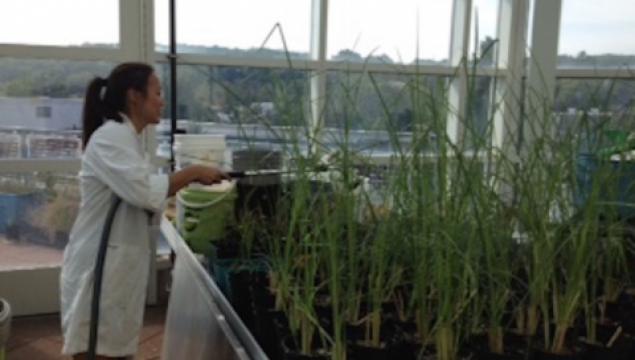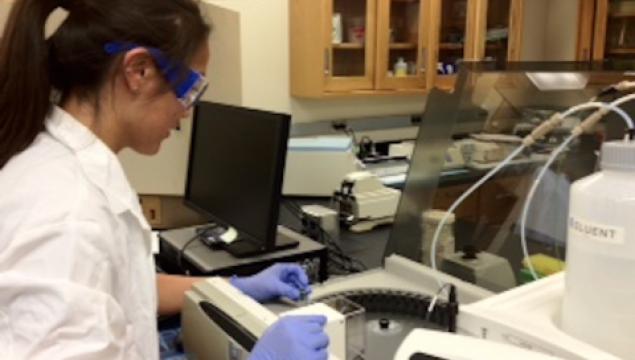Multitasking Grasses: Phytoremediation Coupled with Biofuel Production
Why This Project Is Important
Soils in the region are heavily contaminated with heavy metals due to history of mineral mining. This is a problem because some heavy metals, at elevated concentrations, can pose health and environmental risks. Currently, the heavy metal contaminated plant material is incinerated or burned after taking up metals, which is a problem because it can actually cause further pollution. During the process of incineration, the heavy metals volatilize (enter the atmosphere) or are turned into metal oxides in the ash which are soluble and can re-enter the soil when it rains. Mobile soil contaminants have the potential of entering the water table, elevating the levels of heavy metals in our drinking water. Our solution is to make a value added product, ethanol, from the grasses after they have been used to clean up the soil contaminants.
Project Description
This project aims to remediate heavy metal contamination in marginal land (from mineral mining processes) via phytoremediation (uptake of the heavy metals by plant mechanisms), while making use of the heavy metal contaminated biomass to produce an added product, ethanol, for an alternative fuel source. At this point in the project, we have evaluated two different plant species for their ability to take-up metals from contaminated soil. Both species are able to survive in and remediate the toxic heavy metal soil environment. The levels of metals within the plant tissue following uptake are actually within ranges that increase ethanol production, via yeast fermentation, by providing the yeast with necessary co-factors for metabolism (in the same way that humans require vitamins and minerals)! We have also evaluated the effects of heavy metals on the lignin and sugar composition of the plants and have found that the metals did not impact or reduce the fermentability of the grasses. This means that plant growth in the presence of toxic levels of metals does not reduce the sugars that can be converted to ethanol. At this point, we are using Response Surface Methodology (RSM- a statistical optimization method) to design studies for optimizing the amount of sugars released from the plant matter and to minimize the amount of fermentation inhibitor compounds from the plant matter for the production of ethanol. By maximizing the release of sugars by methods called dilute acid pretreatment or enzymatic saccharficiation and minimizing inhibitors in solution, we can optimize the yield of ethanol from the heavy metal contaminated biomass during fermentation. We are at the point of optimizing the actual fermentation by investigating factors such as yeast species, time, temperature, pH, and innoculation rate.
Meet the Researchers

Rupali Datta
Dr. Datta’s primary research interest lies in the application of plant biochemistry, genetics, molecular biology and microbiology in solving environmental problems,using phytoremediation, plant-microbe interactions and bioremediation. Dr. Datta’s research involves the study of interactions between plant, soil, microbial and water systems to understand the mechanisms of uptake and detoxification of specific environmental contaminants in biota from two broad angles – biochemistry and genetics.
Specifically, Dr. Datta’s current research focus is on the study of bioavailability of metal and organic contaminants in aquatic media and the potential of using plants to remediate contaminated sites, mediated by microbes. Dr. Datta actively collaborates with environmental geochemists, soil scientists, microbiologists and analytical chemists. Dr. Datta also works on the bioavailability of contaminants using in-vitro and in-vivo models. She has also been working on the remediation of antibiotics, TNT, RDX, petroleum hydrocarbons, perchlorate and chromate in soil and water and in developing “green technology” as part of an environmental R&D, SIROM Scientific Solutions, LLC based in Montclair,...


days left
funded
last
What Your Donation Can Help Us Do:
- The donations will enable us to repair a piece of analytical equipment necessary for measuring carbohydrate and ethanol concentrations.
Recent Donors
Some donors may be hidden.








 Gifts to projects listed on SUPERIORIDEAS.ORG are received and processed by Michigan Tech Fund. Michigan Tech Fund is a tax-exempt organization under Section 501(c)(3) of the Internal Revenue Code acting on behalf of Michigan Technological University. It is the policy of Michigan Tech Fund that a portion of the gifts and/or income therefrom may be used to defray the costs of raising and administering the funds.
Gifts to projects listed on SUPERIORIDEAS.ORG are received and processed by Michigan Tech Fund. Michigan Tech Fund is a tax-exempt organization under Section 501(c)(3) of the Internal Revenue Code acting on behalf of Michigan Technological University. It is the policy of Michigan Tech Fund that a portion of the gifts and/or income therefrom may be used to defray the costs of raising and administering the funds.